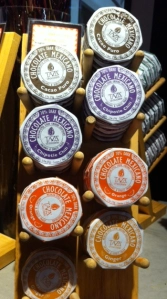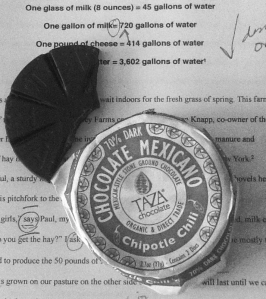 Valentine’s Day is a day we show love for our significant others. Others has broadened to include, our children, children’s teachers, co-workers, and friends. A natural addition to my circle of love are farmers and communities in the tropics of the world who grow and harvest the chocolate tucked away in heart shaped boxes and foil-wrapped bars of sweet goodness.
Valentine’s Day is a day we show love for our significant others. Others has broadened to include, our children, children’s teachers, co-workers, and friends. A natural addition to my circle of love are farmers and communities in the tropics of the world who grow and harvest the chocolate tucked away in heart shaped boxes and foil-wrapped bars of sweet goodness.
Worldwide, chemicals are relied upon to impede disease, fungus and pests spoiling 30-40 percent of annual harvests. In regions of West Africa, where agrochemicals are heavily subsidized, pesticides usage doubled between 2007-2010. In Nigeria, diazinon, a high toxic pesticide was found at “above acceptable levels” in streams and wells in villages where cacao is the primary industry. Thirty-four percent of farmers in nine villages were found with the poison in their blood. The powerful insecticide can damage the human nervous system and is especially dangerous to children. The human health risk led the EPA to ban the sale of diazinon in 2004 for residential (diazinon remains legal for crops).
Cacao has a long history of child labor abuses including human trafficking of children to work on farms. In the Ivory Coast and Ghana, for example, 50 percent of children living in agricultural households work. It is common for these children to apply pesticides to crops, such as diazinon, applied without protective gear, a requirement in the U.S.
Organic certification forbids the use of pesticides to grow cacao. Instead, farmers use other methods to minimize pest and fungus, such as keep the trees pruned and trimmed and have the right balance of compost, sun, and shade. In return for Organic certification, farmers receive a premium to offset increased labor cost. Socially responsible trade programs, like Fairtrade, Rainforest Alliance and European based UTZ, prohibit child labor and require fair wages. Fair trade programs, while not organic, require minimized pesticide use, reduction of greenhouse gas emissions and ban untreated wastewater disposal into rivers and streams. In exchange, the certified farms are awarded price premiums and price floors.
 Latin America is the sweet spot for organic production, alone representing 70 percent of the market share. The acreage of organic cacao expands worldwide, but the expansion is slow. As of 2012, only 0.5 percent of the world’s harvest was certified organic. Socially responsible certification such as Fairtrade comprises 6 percent of the market. Three of the largest U.S. based chocolate manufacturers have committed to purchasing Rainforest certified cacao for all or part of their chocolate by 2020.
Latin America is the sweet spot for organic production, alone representing 70 percent of the market share. The acreage of organic cacao expands worldwide, but the expansion is slow. As of 2012, only 0.5 percent of the world’s harvest was certified organic. Socially responsible certification such as Fairtrade comprises 6 percent of the market. Three of the largest U.S. based chocolate manufacturers have committed to purchasing Rainforest certified cacao for all or part of their chocolate by 2020.
But “we” the consumer drive demand. We need to demand certified organic and socially responsible chocolate AND be willing to pay more for the premium chocolate.
Below are my top three favorite certified chocolate companies who spread the love.
Eat less water at the kitchen table. There is power in the collective.
Be well,
Florencia

Taza Stone Ground Chocolate
www.tazachocolate.com
Taza Chocolate is certified organic and institutes a direct trade program with chocolate cooperatives in Latin America. This chocolate factory is featured in my Chocolate and Water chapter. Taza Chocolate is found at specialty markets and on their website.
Theo Chocolate
www.theochocolate.com
Theo Chocolate is organic, and Fair Trade certified. According to their website, they are the first U.S. chocolate company to be both. Their chocolate can be found at many grocery stores and specialty shops around the U.S. and on their website.
Equal Exchange Chocolate
www.equalexchange.coop
Equal Exchange sells a mini organic fair traded chocolate bar found on their online store that is perfect to attach to those classroom valentine’s cards.
Exactly what I was looking for. You nailed it! Congratulations!
On Wednesday, February 4, 2015, Eat Less Water wrote: > Florencia Ramirez posted: ” Valentine’s Day is a day we show love for our significant others. Others has broadened to include, our children, children’s teachers, co-workers, and friends. A natural addition to my circle of love are farmers and communities in the tropics of” >
Thank you Dani!
Great post Florencia, and great reminder about awareness! Chocolate is our family’s all time favorite “vice”—we’re big fans of Tazo too. Have you tried Madecasse? They’re pretty awesome–grown, harvested, processed, and made in Africa: http://www.madecasse.com/our-impact/
Big hugs to you all. Peace,
April Cantor founder and director april@soulshinelife.com 347-645-0453
Let your Light SHINE!
http://www.soulshinelife.com Kids Yoga Adventures and Family Yoga Workshops & Retreats
Hi April,
I haven’t tried Madecasse but I will certainly be on the lookout. I always have chocolate in my cupboard too. I don’t consider organic, fair-traded chocolate a vice…now other chocolate, especially with palm oil is another story.
Be well,
Florencia